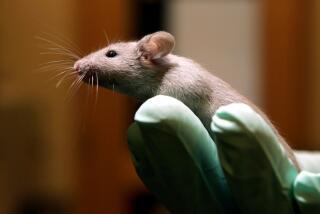The specter of human cloning
- Share via
A breakthrough in stem cell research has again raised the specter of human cloning. The discovery by a team at Oregon Health and Science University moves the world incrementally closer to that result, but its more immediate effect will be to spur efforts to regenerate healthy tissue for the injured and the ailing. Although it’s reasonable to worry about where such a discovery may lead, those concerns shouldn’t stop researchers from exploring the restorative properties of stem cells.
The promise of stem cells is that they can develop into many different kinds of tissues rather than being locked into a specific cellular fate. Researchers are using them to replicate and study diseased cells, and a few therapies involving stem cells are already in limited use.
The team at OHSU, which disclosed its work in a paper published online by Cell, created embryonic stem cells by replacing the nucleus in an unfertilized human egg with the nucleus from a skin cell, then harvesting the resulting stem cells. This long-sought technique may eventually let doctors create replacement cells for a wide variety of tissues from bits of a patient’s own skin.
One advantage to this approach is that, unlike much of the initial work on stem cells, it doesn’t require the destruction of human embryos. That practice drew fierce opposition from some religious leaders and right-to-life groups, although their criticism has faded as researchers switched to adult stem cells and, more recently, regular cells reprogrammed into stem cells through genetic engineering.
Some critics continue to argue that it’s unethical to manipulate the genetic makeup of human eggs even if they’re unfertilized, and others warn about potential harm to egg donors. The biggest ethical issue for the OHSU team, though, is that it artificially created a human embryo, albeit one that was missing the components needed for implantation and development as a fetus.
Much more research would have to be done before a lab could clone a viable, implantable human embryo, scientists say, and such studies would face real barriers at the Food and Drug Administration, the federal agencies that fund scientific research and the journals that publish it. There are also laws in several states, California among them, that bar human cloning. Still, the federal government needs to set rules that would stop researchers in this country from crossing the line between generating stem cells and trying to bring a cloned embryo to life. Adding a clear prohibition would help assure the public that stem cell research should be embraced, not feared.
More to Read
A cure for the common opinion
Get thought-provoking perspectives with our weekly newsletter.
You may occasionally receive promotional content from the Los Angeles Times.






